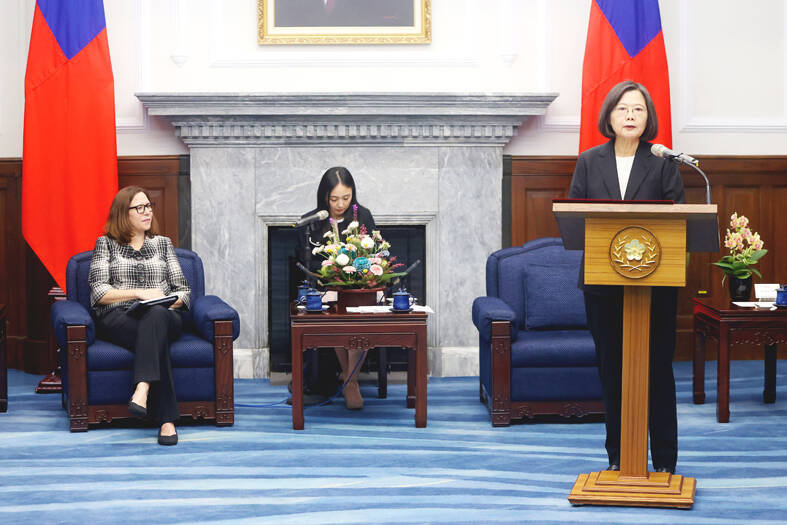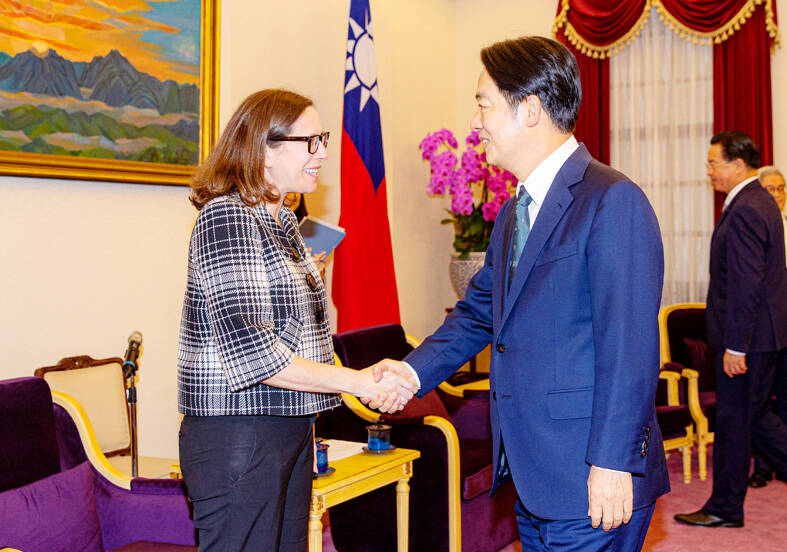American Institute in Taiwan (AIT) Chair Laura Rosenberger yesterday said during a meeting with President Tsai Ing-wen (蔡英文) that she hoped to see the US and Taiwan maintain the “rock-solid” relations they currently enjoy.
Rosenberger, who arrived on Sunday and is scheduled to leave on Saturday, would “demonstrate the United States’ strong US commitment to Taiwan and advance the growing US-Taiwan partnership,” the AIT said in a statement on Sunday.
Congratulating Taiwanese on conducting free and fair elections in January, Rosenberger said that elections in Taiwan have always been a model for the Indo-Pacific region and the world.

Photo: CNA
After the elections, Taiwan received many congratulatory messages from around the world — a recognition of the enduring strength of Taiwan’s democracy, she said.
Taiwan maintained a close partnership with the US in economics, security and people-to-people exchanges during Tsai’s tenure over the past eight years, Rosenberger said.
Noticeable recent achievements in the relationship include a memorandum of understanding on international development cooperation signed in February, as well as the fourth High-Level Dialogue on the US-Taiwan Education Initiative and the fourth US-Taiwan Consultations on Democratic Governance in the Indo-Pacific Region that were held last month, she said.

Photo: CNA
The economic ties between Taipei and Washington are always strong and continue to deepen, Rosenberger said, citing US President Joe Biden’s Trade Policy Agenda released last month, which highlights the US-Taiwan Initiative on 21st Century Trade as one of the economic visions the US government is working on.
She also said that efforts to provide double taxation relief to Taiwanese businesses and workers in the US are ongoing.
Taiwan is a beacon of democracy in the region, boasting a vibrant society, a thriving economy and world-leading technologies, Rosenberger said.
The US sees Taiwan as a crucial partner, she said, adding that safeguarding peace and stability is a goal shared by Taiwan and the US.
Washington has a “rock-solid, principled and bipartisan” commitment to Taiwan and hopes the latter will endeavor to maintain that solid relationship, she said.
Tsai thanked Rosenberger for visiting Taiwan five times since taking office in March last year, saying it “demonstrated her enthusiasm for deepening Taiwan-US relations.”
The partnership between Taiwan and the US continues to grow ahead of the 45th anniversary of the enactment of the Taiwan Relations Act on April 10, 1979, Tsai said.
Taiwan would continue to cooperate with the US and other democracies to ensure regional stability and promote global prosperity, she added.
Later yesterday, during a meeting with Vice President William Lai (賴清德), the president-elect, Rosenberger expressed confidence that Taiwan and the US would grow closer after he takes office.
Lai thanked Rosenberger for leading a delegation to Taiwan shortly after the elections to offer their congratulations and invited her to attend his inauguration on May 20.
During her trip this week, Rosenberger is also to meet with academics and politicians from across party lines to explore the possibility of collaborating on “regional security, mutually beneficial trade and investment, and people-to-people educational and cultural ties,” the AIT said.

‘CORRECT IDENTIFICATION’: Beginning in May, Taiwanese married to Japanese can register their home country as Taiwan in their spouse’s family record, ‘Nikkei Asia’ said The government yesterday thanked Japan for revising rules that would allow Taiwanese nationals married to Japanese citizens to list their home country as “Taiwan” in the official family record database. At present, Taiwanese have to select “China.” Minister of Foreign Affairs Lin Chia-lung (林佳龍) said the new rule, set to be implemented in May, would now “correctly” identify Taiwanese in Japan and help protect their rights, the Ministry of Foreign Affairs said in a statement. The statement was released after Nikkei Asia reported the new policy earlier yesterday. The name and nationality of a non-Japanese person marrying a Japanese national is added to the

AT RISK: The council reiterated that people should seriously consider the necessity of visiting China, after Beijing passed 22 guidelines to punish ‘die-hard’ separatists The Mainland Affairs Council (MAC) has since Jan. 1 last year received 65 petitions regarding Taiwanese who were interrogated or detained in China, MAC Minister Chiu Chui-cheng (邱垂正) said yesterday. Fifty-two either went missing or had their personal freedoms restricted, with some put in criminal detention, while 13 were interrogated and temporarily detained, he said in a radio interview. On June 21 last year, China announced 22 guidelines to punish “die-hard Taiwanese independence separatists,” allowing Chinese courts to try people in absentia. The guidelines are uncivilized and inhumane, allowing Beijing to seize assets and issue the death penalty, with no regard for potential

‘UNITED FRONT’ FRONTS: Barring contact with Huaqiao and Jinan universities is needed to stop China targeting Taiwanese students, the education minister said Taiwan has blacklisted two Chinese universities from conducting academic exchange programs in the nation after reports that the institutes are arms of Beijing’s United Front Work Department, Minister of Education Cheng Ying-yao (鄭英耀) said in an exclusive interview with the Chinese-language Liberty Times (the Taipei Times’ sister paper) published yesterday. China’s Huaqiao University in Xiamen and Quanzhou, as well as Jinan University in Guangzhou, which have 600 and 1,500 Taiwanese on their rolls respectively, are under direct control of the Chinese government’s political warfare branch, Cheng said, citing reports by national security officials. A comprehensive ban on Taiwanese institutions collaborating or

STILL COMMITTED: The US opposes any forced change to the ‘status quo’ in the Strait, but also does not seek conflict, US Secretary of State Marco Rubio said US President Donald Trump’s administration released US$5.3 billion in previously frozen foreign aid, including US$870 million in security exemptions for programs in Taiwan, a list of exemptions reviewed by Reuters showed. Trump ordered a 90-day pause on foreign aid shortly after taking office on Jan. 20, halting funding for everything from programs that fight starvation and deadly diseases to providing shelters for millions of displaced people across the globe. US Secretary of State Marco Rubio, who has said that all foreign assistance must align with Trump’s “America First” priorities, issued waivers late last month on military aid to Israel and Egypt, the